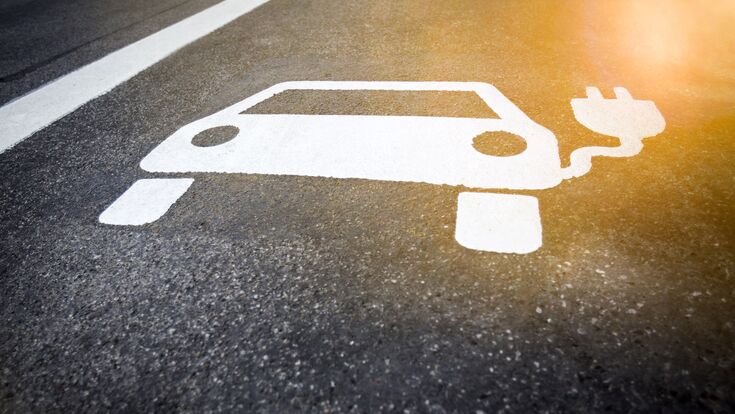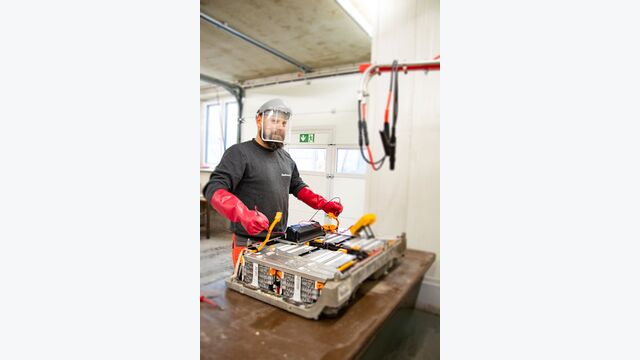Battery Recycling : E-Car Batteries: Ressource scarcity drives recycling

The boom in electric mobility has one flaw: the scarcity of lithium, cobalt and nickel. All these metals are necessary for the production of the car battery. Therefore, recycling e-car batteries is crucial when it comes to implementing e-mobility in the long term. The Association of Austrian Waste Management Companies (VOEB) calls for EU-wide legal and structural framework conditions to recycle electric vehicle batteries as efficiently as possible.
There have never been so many electric cars. By 2030, 98 out of 100 newly registered passenger cars are expected to have either an electronic or hybrid drive. "We need efficient recycling solutions in the next few years to be able to recycle the increasing quantities of e-car batteries," says Dr Andreas Opelt, board member and battery recycling expert at VOEB. At present, there are hardly any facilities for this. This is because e-car batteries are larger and heavier than conventional batteries and the metals they contain are difficult to separate. In addition, it is currently more economical in many cases to use natural raw materials than those obtained in the recycling process in Europe.
Climate change and scarcity of resources are the driving force
It is not only the expected volume of e-cars to be disposed of in the coming years that is pushing the automotive industry, waste management sector, and politicians to improve the recycling of batteries. Rather, growing climate awareness and resource scarcity could be the driving force to push the recycling of e-car batteries. The rising price of lithium is a clear warning signal. As early as 2030, 80% of the lithium mined worldwide is expected to go into the production of e-car batteries, compared to 70% for cobalt and 25% for nickel. "Recovering these metals when recycling an old battery is the safest and most sustainable way to ensure that resource scarcity does not become a hurdle for electromobility," says Opelt.
Recycling e-car batteries
When recycling an e-car, the flammable old batteries must be recycled after 1,500 to 2,500 charging cycles, depending on their useful life and time, estimated at eight to ten years. These can then be reused in the sense of a second-life application, for example as electricity storage in the stationary sector. If this is not the case, the raw materials contained in batteries, such as lithium, cobalt and nickel, can be recovered and used as secondary raw materials in further manufacturing processes - for example for new electric cars. Dr Opelt: "However, this is still very difficult in some cases, as batteries from electric cars are currently still difficult to recycle. The manufacturers must be held accountable and already think about recyclable products when designing the batteries.
Worldwide pilot projects - also in Austria
In Austria, Saubermacher is a pioneer in the recycling of batteries. The company has developed a new process to recycle batteries efficiently. This combines thermal and mechanical processing. Already today, the recycling rate for metals is 95 percent. At the same time, active mass with nickel, cobalt, lithium and copper will be produced in the highest purity for the first time last year. This is unique in the history of battery recycling. But car manufacturers have also cast an eye on the market niche: Ford is working on its own circular economy in the production and recycling of e-car batteries; Volkswagen wants to recycle 97 percent of all the raw materials it needs to produce its cars and Nissan recycles its old e-car batteries itself and uses them to build mobile electricity storage units
EU works on modern battery regulation
The current EU Battery Directive dates back to 2006 and, according to VOEB experts, no longer meets today's requirements. The new EU Battery Directive is to regulate the production and recycling of batteries from mid-2022 - and will then also take into account the new requirements of the Green Deal. These include factors such as the durability and performance of batteries, requirements for manufacturers to no longer permanently install batteries, and requirements for EU member states to collect and recycle used batteries. "Politicians, car manufacturers and waste management companies must work together to create the necessary framework conditions to unite electromobility and the circular economy - for the benefit of our resources and the climate," concludes Andreas Opelt.
Vote on the Battery Regulation in the EU Parliament's Environment Committee
Last week, on 10 February, members of the EU Parliament's Environment Committee debated the Commission's proposal on the Battery Regulation and confirmed the minimum use quotas of recyclates in batteries contained therein. In addition, the committee slightly increased the collection quotas for batteries compared to the EU Commission's proposal. The committee foresees a quota increase to 70 percent by December 2025. The Commission had proposed 65 per cent. By December 2030, the figure is to rise to 80 per cent, which is 10 per cent higher than the Commission's proposal.
The VOEB is clearly critical of the Environment Committee's decision not to introduce a Europe-wide deposit for batteries. The association is also sceptical about the plan to increase the recycling quota for lithium from 35 per cent to 70 per cent from 2026, which is not possible according to the current state of technology. Gabriele Jüly, President of the VOEB: "If the main goal of such a regulation is to improve collection and recycling rates, then we cannot do without the appropriate instruments. A battery deposit would be the ideal prerequisite for ensuring that batteries are returned and collected in an environmentally sound manner. Especially in the case of highly flammable lithium batteries, this would be urgently needed. Batteries are raw material deposits that can be made usable again through proper treatment. A deposit system is the only way to achieve the ambitious collection rates and the associated recycling targets. It is to be hoped that the battery deposit will be included in the regulation after all.

